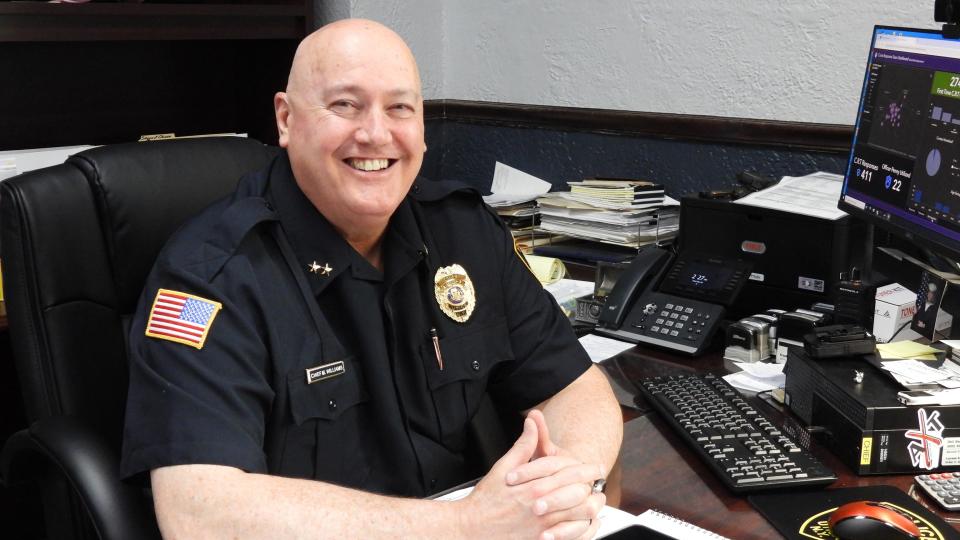Utica Police Chief Mark Williams discusses role of police
While statistics say crime is down in the city of Utica, Chief Mark Williams says it's a matter of perception and that the department is more relied on than ever.
While the five-year average still has outliers due to COVID-19 lockdowns, the overall crime index decreased significantly between the Five-Year-Average, 2022, and 2023.

Over the last five years, the department has averaged 2,149.8 calls for assistance. In 2022, there were 2,625 calls for assistance, and in 2023, there were 2,121 calls for assistance.
And while the department has been working to address crime in the city, Williams said that law enforcement has been impacted by legislation enacted in recent years.
Chief among them are bail reform, Raise the Age, and changes to how discovery is handled. But Williams said he wasn’t against changes; they were just enacted poorly.
“When these laws were enacted, legislators never spoke with district attorneys or law enforcement,” Williams said. “And we’re seeing a lot of controversy around it, especially bail reform and some of the loopholes that get violent offenders out.”
Reforms
People began calling for bail reform after Kalief Browder, a Bronx native, was held for three years from 2010 to 2013 pre-trial on $3,000 bail. He was accused of stealing a backpack, but the charges were dropped due to a lack of evidence. Browder was 16 when he was arrested and took his life in 2015. He was 22.
Sweeping changes came to bail across the state, going into effect in 2020, eliminating pre-trial detention for misdemeanors and most non-violent felonies.
Williams said while he can understand the reactions by lawmakers to cases like Browder’s, cases where individuals are held for long periods of time are endemic to downstate but not in upstate New York.
“We don’t have the volume of crime that they do,” Williams said. “The law is supposed to be ‘one-size-fits-all,’ and now we’re being punished for the justice system downstate, and it’s created loopholes for violent offenders.”
Lt. Michael Curley, public information officer at the Utica Police Department, said that judges don’t have discretion when setting bail, even if the person may be a danger to the community.
“If you’re alleged to have committed a violent crime that is not part of the 13 major crimes that are bail eligible, I think it’s an issue that person’s released,” Curley said.
Just recently, a number of Long Island Senate and Assembly Republicans came together to put forth legislation to make the crime of body dismemberment/concealment of a human corpse a bail-eligible class E felony. This was in response to a case in Babylon after body parts were discovered in a recreational park and several other locations, including a local neighborhood.
According to Senate Republicans, the suspects in the case charged with dismemberment/concealment of a human corpse were released under bail reform.
First to the Scene
The job of the police officer has changed over the years, according to Williams.
“We’re one of the few agencies in Oneida County that started and continues to have a crisis response team,” Williams said. “We have a police officer specially trained in crisis intervention working hand-in-hand with a mental health clinician.”
In 2022, the Utica Police Department received 1,200 calls about mental health issues, and in 2023, that number increased to 1,400.
Williams said the main problem is that many social issues are becoming police issues as there continues to be a lack of support from the state and federal governments.
“We’re the default response,” he said. “We heard during police reform that officers shouldn’t be responding to mental health calls. I’d be glad to take it off our plate, but who’s going to handle the calls? Especially when there are threats of weapons and violence involved.”
In addition to training at the police academy, Williams said the police are receiving cross-training in crisis response so they have the correct tools when handling mental health calls. The officer on the Crisis Response Team is being joined this year by two new Mobile Crisis Assessment team members — and a sheepadoodle named Penny, who’s a trained therapy dog to help children in crisis.
And, while gun violence is always at the forefront of concerns for the Utica Police Department, Williams said that issues that shouldn’t be police issues are taking up more time and resources.
“Mental health, homelessness, and substance abuse,” he said. “These were never meant to be primarily responded to by police. But because we’re the most visible and available, we’ve become the default response. In my opinion, I think police are being overused because other agencies that should be addressing this are failing.”
This article originally appeared on Observer-Dispatch: Utica Chief Williams discusses police and role in mental health

